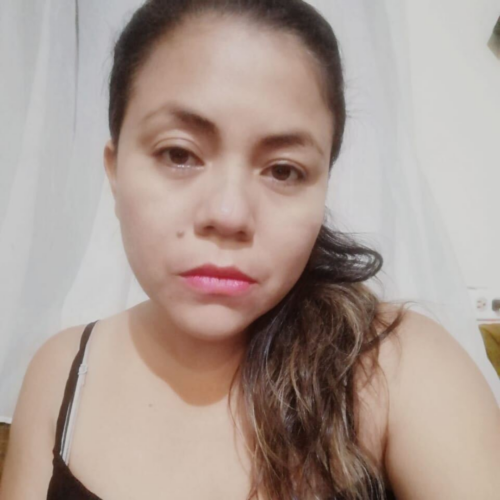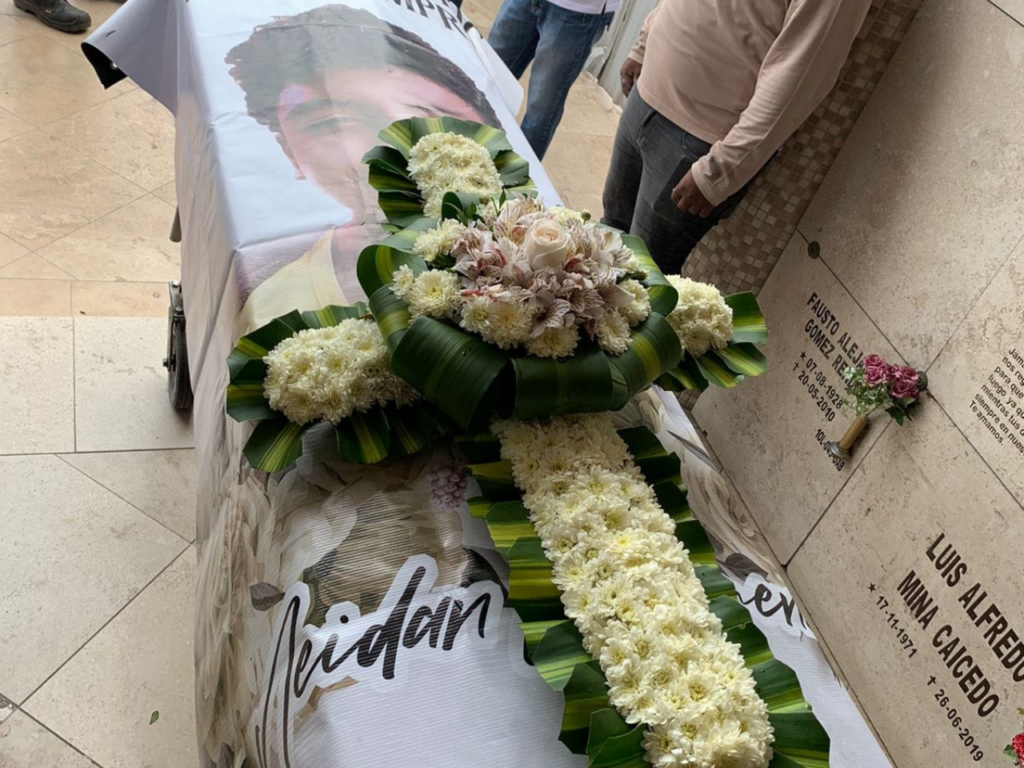In a town in Ecuador, the dead pile up: mother agonizes to recover son’s decomposing body
As soon as I stepped out of the air-conditioned carriage, the stench of decomposition hit me like a wall. I tightened my mask, but it failed to block the foul odor. Desperate to see my son, I pushed past the revulsion and moved closer. Instead of finding him on a metal plate, I saw a black cover on the floor. It sat surrounded by dark, foul-smelling water crawling with worms.
- 1 year ago
August 26, 2024

GUAYAQUIL, Ecuador — I witnessed something no mother ever should: my son’s decomposing body, his bones exposed and skin rotting away. The stench of decay felt unbearable. Guayaquil is a city in Ecuador where insecurity grows unchecked and where the dead multiply faster than the morgue can handle.
I waited nearly two months for my son’s body to be returned to me, neglected and abandoned by the system. No one seemed to care. Yet, despite everything, I finally got him back and gave him the burial he deserved, allowing him to leave this world in peace.
Read more Crime & Corruption stories at Orato World Media.
A mother’s worst fear realized: her son goes missing
On Monday, April 15, 2024, I unknowingly saw my son alive for the last time. Neidan came home from work that afternoon, as usual. He showered, changed clothes, and joked with his sister, just like any other day. He set out for Daniela’s house, his girlfriend, where he spent the nights recently. Before leaving, he gave me a big hug and asked for my blessing, as he always did. “I’ll be back tomorrow after work,” he said, leaving the house with a smile.
Later, Neidan sent me a message saying he wouldn’t be going to work the next day because he and Daniela were going for a walk. I replied with a few written messages and some angry voice notes, scolding him for his decision. He never responded or listened to them. I thought little of it; sometimes he avoided answering me to sidestep an argument.
By the following afternoon, the silence started to weigh on me. At 6:00 p.m., his absence gnawed at my heart, and I decided to contact Daniela’s family. She had not returned home either. A wave of dread washed over me, tightening in my chest. I could barely breathe, and swallowing felt nearly impossible.
That night, sleep eluded me. I kept looking out the window of my room, where I saw the road leading to the house. I hoped to catch a glimpse of Neidan walking home. Through the night, I laid back down, eyes wide open, staring at the ceiling and waiting.
Every time the neighborhood dogs barked, I thought, “Here he comes.” My heart leapt with hope, but each time, it was not him. The entire night passed like this. By Wednesday morning, my anxiety became unbearable. Together with Daniela’s mother, we went to the prosecutor’s office to file a missing person’s report for both of them.
An unexpected call: “Your son’s life is at risk. We’re going to kill him right now”
At the prosecutor’s office, they sent us an image via WhatsApp to print and paste around town to aid in the search. We put up posters everywhere and I shared the image on social media, including my phone number in case anyone had information. Then, my phone rang—a call from an unknown number. The voice on the other end, with a Colombian accent, said, “I have your son.”
It was noon, and I was eating. I leapt out of my chair and rushed down the driveway to get a better signal. In the background, I heard the sound of knives or machetes being sharpened, along with deep voices murmuring. “You need to deposit $1,500 right now,” the voice demanded. “Your son’s life is at risk. We’re going to kill him right now.”
Standing at my front door, I screamed in desperation and nearly fainted. It felt as if the world collapsed around me. One of my other sons rushed over and grabbed my arms, steadying me. At that moment, I snapped back to reality. I needed to stay strong for my son. Gathering every ounce of might, I forced myself to continue the conversation.
They refused to allow me to hang up, so I asked my children to contact Daniela’s mother. The men on the phone told us where to drop off the money and explained how they would return our children to us. We did not have the full amount, so they agreed to accept $500. I rode a motorcycle to the drop-off point, while my husband went with Daniela’s mother to the supposed spot where they held the kids. Meanwhile, I stayed on a group call with the kidnappers and, supposedly, Daniela’s mother.
A heartbreaking confirmation: “My heart froze. I never allowed myself to consider Neidan might be dead”
At one point, I heard a female voice say, “I already have the kids.” Thinking it was Daniela’s mother, I confidently deposited the money. My heart calmed and I breathed again, believing everything would soon return to normal.
While on the way to meet everyone, my husband called and said, “Don’t deposit the money. We don’t have the kids, they never showed up.” The words hit me like a blow. I broke down in tears, overwhelmed with grief and frustration. Denial took over. I kept telling myself these people were just stalling for more money and that they still had our children. I couldn’t bring myself to accept the truth, that they were swindlers.
The following days felt agonizing, filled with silence and dread. On Sunday, April 21, the prosecutor’s office called and told us to head to the morgue. My heart froze. I never allowed myself to consider Neidan might be dead. At the morgue, they informed us two bodies were found, and asked for identifying characteristics of our children to see if they matched.
We left in shock, and later that afternoon, a policeman discreetly sent photos to Daniela’s mother. The bodies were our children. They spared me from seeing those images, but my sister and the other children did. On Tuesday, at the morgue, they showed us more images, and all my hope crumbled. I saw my son in horrific photos, his body already decomposing. They found him days after his death. His face looked nearly destroyed. I recognized him by his ears and teeth. His mouth hung open, his lower lip barely visible, and his eyes gone.
A broken system: DNA tests can take up to 45 days
Daniela’s condition appeared even worse, her face mutilated, likely by animals. The rest of their bodies, however, appeared more recognizable. My son’s hands, chest, and torso were unmistakable. I screamed, “It’s my son!” with a pain so deep. I never felt anything like it before. All I wanted was to hold him one last time, but they told us they had to confirm with DNA tests before releasing the bodies.
At the morgue, the overwhelming smell of chlorine hung in the air. The air conditioning inside the offices masked the smell somewhat, but stepping outside, the chlorine overwhelmed me. It burned my nose and throat. The odor wafted from the back, though I had not yet realized that’s where they stored the bodies in containers.
I returned on May 16 to check if the DNA results arrived, but nothing came in. Two days later they finally took bone samples from the bodies. During that visit, I noticed the employees pouring large amounts of water mixed with chlorine onto the floor, intensifying the smell. The same thing happened on May 18 and again 10 days later. By then, they were not only pouring chlorine water but also spraying liquids with hoses.
I thought little of it at the time, consumed with waiting for the DNA results, which they said could take up to 45 days. That wait felt unbearable. Every day, my mind remained consumed with the thought of my son laying there, in that morgue. Unconsciously, I developed ways to cope. I imagined Neidan on vacation, away on a trip.
Taking matters into our own hands: turning to the media and legal support for justice
Strangely, this fantasy existed alongside my visits to the morgue, where I stood outside, scanning every inch of the building’s facade. I peered through the windows, desperately trying to figure out where my son might be. I felt myself unraveling.
Like me, more and more families searched for their loved ones but got no answers. We heard rumors people demanded money to release the bodies from the morgue. I wanted to pay to get Neidan back, but they refused, saying the DNA testing was in progress and the prosecutor’s office controlled the case.
By June 12, fed up with the endless waiting, I returned to the morgue. An official, cold and callous, said to us, “What do you want those bodies for? They’re just a mass of decay. We won’t risk exposing ourselves to disease by taking them out.” I felt furious and started shouting, demanding a solution. Yet, all I received was cynicism and indifference.
That same afternoon, we went to the media and sought legal help to push the matter forward. It worked. The next morning, the authorities told us to come and collect Neidan and Daniela’s bodies. That day, we first went to the offices to sign some papers. Then, with the funeral home staff, we took a carriage to the containers at the back of the building.
The workers put on special suits while I only had a simple mask. As we approached, we saw people cleaning outside and an open container. Inside, about two hundred bodies lay stacked on top of each other. From there, they retrieved the bodies of our children.
A mother finally recovers her son’s body and lays him to rest
As soon as I stepped out of the air-conditioned carriage, the stench of decomposition hit me like a wall. I tightened my mask, but it failed to block the foul odor. Desperate to see my son, I pushed past the revulsion and moved closer. Instead of finding him on a metal plate, I saw a black cover on the floor. It sat surrounded by dark, foul-smelling water crawling with worms. Nearby, a metal box waited for the funeral home workers to place the body inside.
When Daniela’s mother voiced her doubts, asking, “How do I know these are our children,” they opened the cases. The sight looked horrific, just bones with decaying flesh hanging off, riddled with maggots. I can never erase that image from my mind. The undertakers poured a thick layer of lime over the sealed cover and packed the box.
I asked them to bring my son’s body home. I needed to watch over him and pray for him, feeling unready to let go. We built a simple box and kept him for four hours. Miraculously, the stench never escaped, which I attribute to God. We placed ice bags beneath the box and used fans to keep the air cool. After a brief ceremony, we took his body to the cemetery near my home.
In the weeks that followed, nightmares plagued me. The image of my son covered in maggots regularly appeared in my mind. It felt deeply traumatic. I would not call it relief, but I took some comfort knowing I never abandoned my son’s body. I did everything in my power to take him to a place where I could leave flowers for him. He no longer lays in that morgue. I honored him, just as he asked me to in a dream.



































































































































































































































































































































































































































































